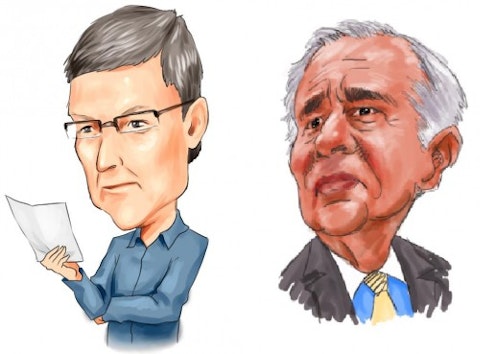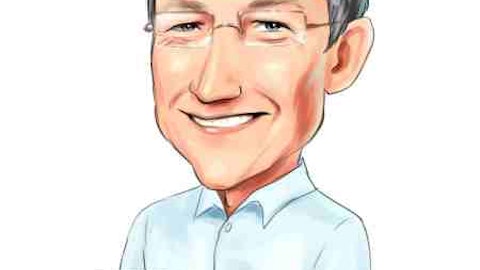Barron’s published an article on Apple Inc. (NASDAQ:AAPL) this weekend arguing that investors may be holding too much of Apple which may create diversification problems. “AS PROBLEMS GO, of course, Apple’s a pretty good one to have. Not only does the company continue to produce innovative products and break sales records, its growing dividend (now yielding 1.5%) has made the stock more attractive to value investors. And at less than 15 times forward earnings, it doesn’t look pricey,” Avi Salzman said about the tech giant.

Apple is the most popular stock among hedge funds (see the list of 10 most popular stocks), and the media coverage may give the impression that the smart money is overweight the stock. The numbers tell otherwise. Apple is the most popular stock among hedge funds but collectively hedge funds tracked by Insider Monkey owned less than $21 billion of Apple Inc. shares, corresponding to 3.2% of its outstanding shares. Carl Icahn personally accounted for $5.8 billion of the aggregate $20.8 billion in hedge fund investments. Clearly he is the most bullish hedge fund manager. Excluding Carl Icahn, who isn’t technically a hedge fund manager who manages money for outside investors, the remaining 700+ hedge funds owned only 2.3% of Apple’s outstanding shares. Apple’s weight in the S&P 500 Index is 3.9%. Barron’s also reported that “of the mutual funds that own Apple, the average stake is 3.3% of assets”. There is a sizable number of other mutual funds with no Apple positions. So, it is clear that actively managed mutual funds are also underweight Apple Inc. Overall, smart money seems to be underweight, and individual investors, whom we call dumb money because of their historically poor returns, are overweight the stock.
We pay attention to hedge fund holdings because historically hedge funds’ long stock picks managed to generate positive alpha. Our research has revealed that the 50 most popular large-cap stocks among hedge funds managed to generate an annual alpha of less than 1 percent, but this is still better than the index funds that guarantee that investors will have zero alpha. The 15 most popular small-cap stocks among hedge funds, on the other hand, generated an annualized alpha of 10 percentage points between 1999 and 2012. We have also been tracking the performance of hedge funds’ top small-cap ideas since the end of August 2012. These stocks returned 137% over the past 31 months, vs. a 57% gain for the S&P 500 Index funds (read the details here).
Hedge funds reduced their Apple holdings over the last three months of 2014. Given Apple Inc.’s 13.2% gain in Q1, their moves seem premature. Our research indicated that hedge funds aren’t particularly very good at timing, so it isn’t surprising that they may be a little bit early selling their Apple holdings. We talked to one of these fund managers and asked him why he bought Apple in the first place and why he sold those shares recently. Here is how Jim Roumell explained why he bought Apple when the stock was trading at $500:





